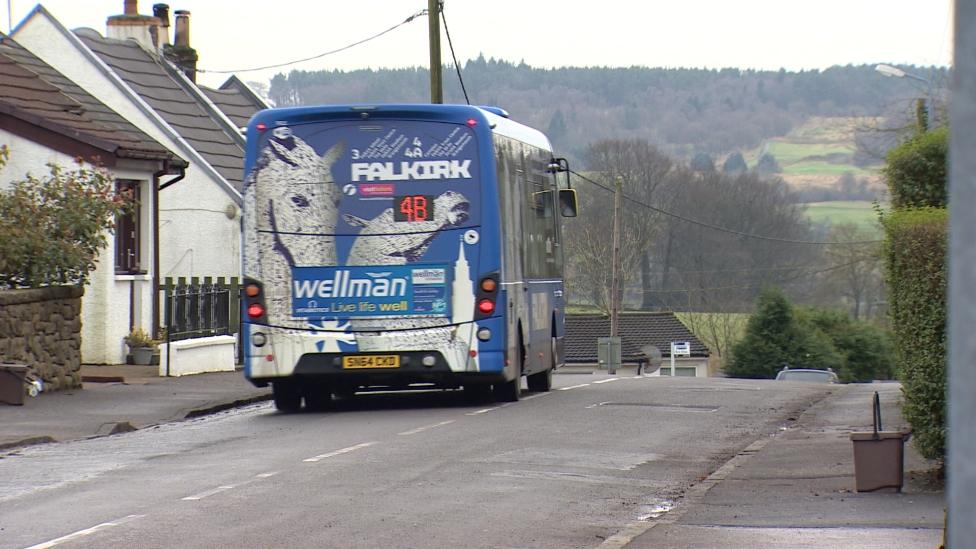Rural areas of Scotland 'let down' by bus services
- Published

Scotland's buses were deregulated by Margaret Thatcher's government in the 1980s
MSPs are being urged to radically change the way Scotland's bus services are run.
The Unite union says communities are being let down by privately-operated routes leading to falling passenger numbers and rising fares.
Scotland's buses were deregulated by Margaret Thatcher's government more than 30 years ago.
The Scottish government has said it was ploughing almost £250m a year into the bus network.
But ministers have ruled out wholesale re-regulation of buses in Scotland.
'Most vulnerable'
At the moment, almost all routes are operated by private companies, which do not have to run services which are unprofitable.
Unite said this approach had failed communities and has petitioned the Scottish Parliament, calling for a change in policy to allow local authorities to control bus services.
Buses to rural communities tend to be the least profitable for operators - and so these routes are most vulnerable to being cut or severely reduced.
The village of Banton, North Lanarkshire, is not the most isolated community in Scotland by a long way. It is just a few miles from a major A-road and the M80.
But those few miles make all the difference to how well it is served by buses.
It already has a limited bus service and the current provision could be under threat. Margaret Chalmers has lived in Banton for 20 years. She does not have a car and told BBC Scotland she relied completely on public transport.
I normally go to Falkirk or Kirkintilloch, but the thing is now we need to get off at Kilsyth and wait and try and get another bus," she said.
"And they're talking now about putting the Falkirk one off as well and it's just not fair on us people that don't drive."
Ms Chalmers said the limited timetable made it difficult to get to health centre appointments - or to leave the village at all at a weekend.
"We've no bus on a Sunday either. We're marooned out here basically. A wee lost village," she said.

Analysis from BBC Scotland's transport correspondent David Henderson

Buses are Scotland's most-used form of public transport. Four times as many journeys were made by bus than train in 2015-16.
That year, there were 407 million bus journeys made in Scotland. A whopping number, no doubt - but that's a reduction from 414 million the previous year.
There's been a decade-long decline in the number of routes, and fares have risen.
Some think the way bus services are run could be a cause of this decline.
Train services are run by a single operator, ScotRail. But over 200 bus companies are involved in running Scotland's bus network.
When ScotRail fall below their targets, they're the focus for complaints. Bus firms are judged by different standards - and holding them to account is difficult.
In the 1980s, Margaret Thatcher deregulated Scotland's bus service. Routes were opened up to competition. The Iron Lady argued this would increase choice for bus passengers, and drive down fares.

Young people living in the village of 400 - who are probably among the least likely to own a car - are also worried about the possible loss of a vital transport link.
School pupil Eilidh Dunsmore said: "If I stay after school, I wouldn't be able to get the bus if the bus stopped and I'd have to rely on my parents then. But my parents might be at work so I won't be able to do that.
"I can't get to work and I can't get to go out with my friends or anything so it'll be difficult. When I leave school I won't be able to go to college without relying on my mum and dad."
In Scotland, more people use buses than any other form of public transport. The services are mostly run by hundreds of private bus firms.
Unite has pointed to changes being made in England which give powers to councils to regulate buses.
Pat Rafferty, the union's Scottish secretary, has argued that this could lead to a much better service for rural areas.
"You can't have it that you're handing over such a vital service to the community to a private sector firm and allowing that firm to dictate what it will and won't do in terms of that service to the public," he said.
"It needs to be expressed and stipulated and a control given and regulations given to local authorities and the Scottish government about what you are required to do as part of that tender process."
Public subsidy
Unite took its petition to the Scottish Parliament on Thursday.
The convener of the Public Petitions Committee, Johann Lamont, said "compelling evidence" of problems facing bus users had been presented.
"While bus companies are subsidised to the tune of £2.6bn, routes have dropped by 26 million since and fares are up by 18% since 2007," she said.
"Meanwhile, 40% of bus income comes from the public purse, and more journeys by bus are made than any other form of transport, with lower income groups and communities particularly targeted by reduced services.
"There is clearly an issue here on the level of public subsidy for a service which, based on the evidence we have heard, does not adequately serve the public."
A spokeswoman for the Scottish government said: "The Scottish government is committed to improving bus services and the workings of the current regulatory framework, and look to work in partnership with bus operators and local transport authorities to improve bus services.
"Whilst we have no plans for wholesale re-regulation we do want to see more people using our public transport networks.
"That is why we continue to work with users and stakeholders to see where we can improve funding and regulation, including via the upcoming Transport Bill."